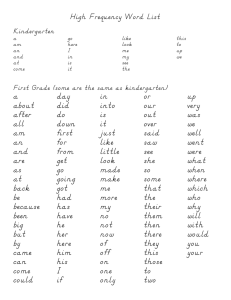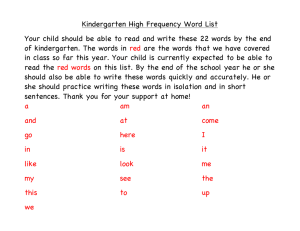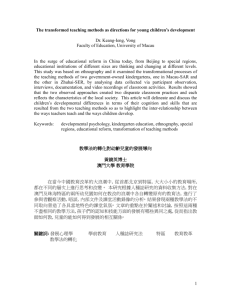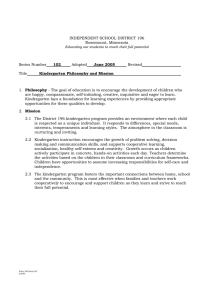RELIGIOUS DIVERSITY IN KINDERGARTENS IN VIENNA Helena Stockinger, 17.11.2014
advertisement
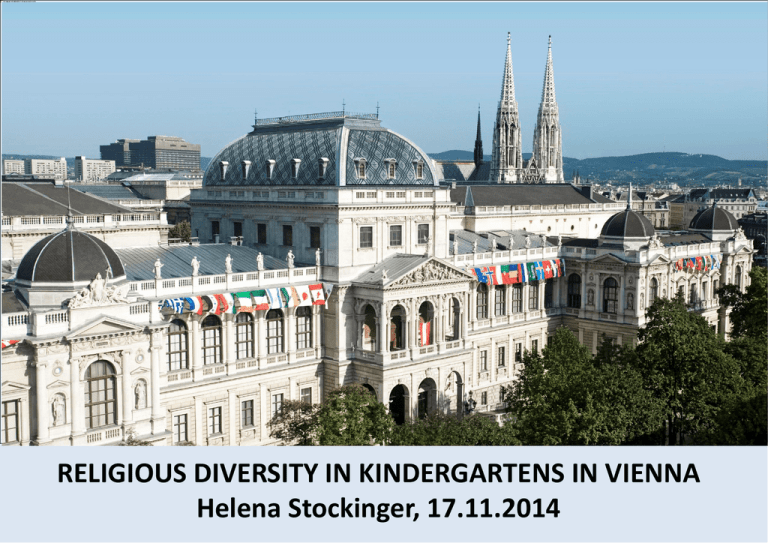
RELIGIOUS DIVERSITY IN KINDERGARTENS IN VIENNA Helena Stockinger, 17.11.2014 Outline • • • • • Preface Religous landscape in Austria and Vienna Studies on religious diversity on young children Research question Research design • Methods • Selection of kindergartens • First results • Handling of religious diversity in kindergartens • Conversations of children about religious diversity Introduction • Diverse contexts in Europe • Importance of the institution kindergarten • “The preparation of the child for responsible life in a free society, in the spirit of understanding, peace, tolerance, equality of sexes, and friendship among all peoples, ethnic, national and religious groups and persons of indigenous origin” (Article 29, Convention on the Rights of the Child) AUSTRIA VIENNA Roman Catholic: 73.7 % / 62.5% Roman Catholic: 49.2 % / 37.1 Protestant: 4.7 % / 3.7 % Protestant: 4.7 % Islamic: 4.2 %/ 6.8 % Islamic: 7.8 % / 12.5 % Orthodox: 2.2 % / 5.8 % Orthodox: 5.8 % no religious denomination: 12 % no religious denomination: 25.6 % not specified: 2 % not specified: 4.2 % other religious denominations: <1 % other religious denominations: <1 % Population Census 2001 / Estimate 2012, 2013 Studies about religious diversity in kindergartens in Germany • Hoffmann, Eva: Interreligiöses Lernen im Kindergarten? Eine empirische Studie zum Umgang mit religiöser Vielfalt in Diskussionen mit Kindern zum Thema Tod. Berlin: LIT 2009. • Edelbrock, Anke/Schweitzer, Friedrich/Biesinger, Albert (Hg.): Wie viele Götter sind im Himmel? Religiöse Differenzwahrnehmung im Kindesalter. Interreligiöse und interkulturelle Bildung im Kindesalter Band 1. MünsterNew York-München-Berlin: Waxmann 2010. Research question How is religious diversity in kindergartens handled and how do young children talk about religious diversity? Research design • • • • • Ethnographic approach Grounded Theory (Strauss/Corbin 1996; Corbin/Strauss 2008) Thematic Coding (Flick 2007) Transcription of all the data Coding and memoing Methods of the research • • • • Observation during one school year Group discussion with the children Group discussion with the pedagogues Interviews with the heads of the kindergartens Selection of the two kindergartens • Same district in Vienna • Children of all religious denomination are allowed to visit the kindergarten • Heads of the kindergartens assume religious diversity as positive • Respect for other religions in the concept • Religion is a factor in the kindergarten • A Catholic and an Islamic kindergarten Religious denominations in the 2 kindergartens Catholic kindergarten Islamic kindergarten Catholics: 45.7 % Catholics: 8.1 % Muslims: 17.4 % Muslims: 91.9 % No religious denomination: 17.4 % Orthodox: 13.1 % Hindu: 2.2 % Sikhs: 2.2 % First findings • Tendencies concerning religious diversity in kindergartens • Tendencies concerning the conversation of children about religious diversity Conceptual considerations of religion and religious diversity in the kindergartens • • • • Religion as part of the daily routine Religion as additional, voluntary service Concepts are fragmentary No enforcement to take part in religious activities Elements of religion and religious diversity in the kindergarten • Celebrations • Prayers • Conspicuity of religion in the kindergarten • Religious activities Celebrations • • • • • Religious celebrations of the majority religion Religious celebrations of the non majority religion Celebrations with no religious background Secularised celebrations of religious origin Providing information about religious celebrations Prayers • • • • Prayers of the majority religion No prayers of the non majority relgion Unified prayers Secular slogan instead of a prayer Communication about religious diversity in the kindergartens • Some efforts to broach the issue of religious diversity • Avoidance of communication about religious diversity • Reasons for the avoidance: • • • • • to avoid challenges and conflicts to follow the tradition missing knowledge equality for all the children religion as teaching values Summary of religious diversity in the kindergartens • Fragmentary concepts • Dominance of the majority religion • Lack of communication First findings • Tendencies concerning religious diversity in kindergartens • Tendencies concerning the conversation of children about religious diversity Topics raised by children of the majority group about their own religion Catholic kindergarten: • Church • Celebrations Islamic kindergarten: • Qu`ran • Mosque • Washing before prayer • Moral commitment • Celebrations • Own religious denomination How children of the non majority group discuss their own religion Catholic kindergarten • no discussion of their religious denomination or any religious celebration Islamic kindergarten • mentioning not being a Muslim How children in the Catholic kindergarten discuss religious diversity Non majority relgion: • do not mention their absence Majority religion: • notice the absence of some peers • do not have any explanation for this. How children in the Islamic kindergarten discuss religious diversity Non majority religion: • mention that they do not take part in Religious Education, because they are not Muslims Majority religion: • questions about religious denominations, religious habits, celebrations • notice absence of some children in Religious Education and have explanations for this How children of the non majority religion behave concerning religious diversity • Participation in majority religious behavior • Differentiation of the children to the religious behavior of the majority religion • Alternation between participation and differentiation Summary of the discussion of religion and religious diversity of the children • Differences between the two kindergartens • Differences between the majority and the non-majority religion • Children notice religious differences, sometimes they do not have explanations. • Differences seem to be a matter of course for the Muslim children in the Islamic kindergarten. • Children do not talk about religious differences in the Catholic kindergarten. • Children of the non majority group do not talk about their religion. A few implications because of the empirical findings • Kindergartens have to find structures that do not discriminate against the non majority religion • Educational system • Support for the kindergarten teachers • Development of the kindergartens • Support communication in the kindergartens • Support from a not involved person For further questions or remarks: helena.stockinger@univie.ac.at
